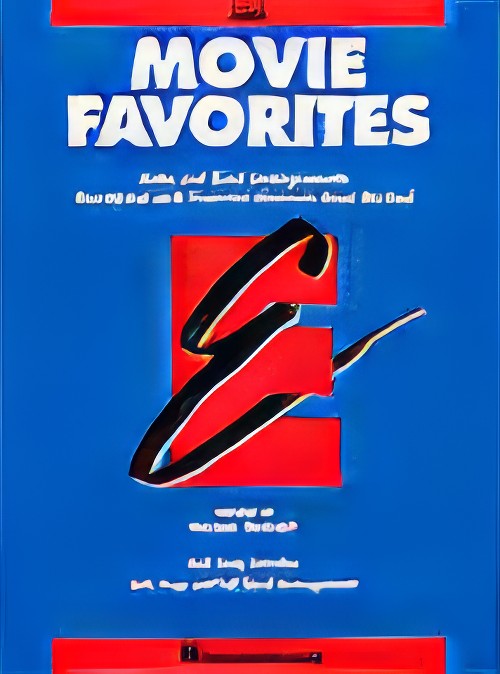Results
-
 £8.50
£8.50MOVIE FAVORITES Bassoon
A collection of popular movie songs arranged to be played by either full band or by individual soloists with optional CD accompaniment. There is also an optional Piano Accompaniment part. Contents: Forrest Gump - Main Title; The John Dunbar Theme; Theme from 'Jurassic Park'; Raiders March; Chariots of Fire; Apollo 13; Somewhere Out There; Man from Snowy River; Star Trek - The Motion Picture; Theme from E.T.; Back to the Future
Estimated dispatch 7-14 working days
-
 £28.50
£28.50Movie Favorites Conductor (inc. CD accompaniment) - Sweeney, Michael
A collection of popular movie songs arranged to be played by either full band or by individual soloists with optional CD accompaniment. There is also an optional Piano Accompaniment part. Contents: Forrest Gump - Main Title; The John Dunbar Theme; Theme from 'Jurassic Park'; Raiders March; Chariots of Fire; Apollo 13; Somewhere Out There; Man from Snowy River; Star Trek - The Motion Picture; Theme from E.T.; Back to the Future
Estimated dispatch 7-14 working days
-
 £8.50
£8.50MOVIE FAVORITES F Horn
A collection of popular movie songs arranged to be played by either full band or by individual soloists with optional CD accompaniment. There is also an optional Piano Accompaniment part. Contents: Forrest Gump - Main Title; The John Dunbar Theme; Theme from 'Jurassic Park'; Raiders March; Chariots of Fire; Apollo 13; Somewhere Out There; Man from Snowy River; Star Trek - The Motion Picture; Theme from E.T.; Back to the Future
Estimated dispatch 7-14 working days
-
 £8.50
£8.50MOVIE FAVORITES Oboe
A collection of popular movie songs arranged to be played by either full band or by individual soloists with optional CD accompaniment. There is also an optional Piano Accompaniment part. Contents: Forrest Gump - Main Title; The John Dunbar Theme; Theme from 'Jurassic Park'; Raiders March; Chariots of Fire; Apollo 13; Somewhere Out There; Man from Snowy River; Star Trek - The Motion Picture; Theme from E.T.; Back to the Future
Estimated dispatch 7-14 working days
-
 £8.50
£8.50MOVIE FAVORITES Trombone BC
A collection of popular movie songs arranged to be played by either full band or by individual soloists with optional CD accompaniment. There is also an optional Piano Accompaniment part. Contents: Forrest Gump - Main Title; The John Dunbar Theme; Theme from 'Jurassic Park'; Raiders March; Chariots of Fire; Apollo 13; Somewhere Out There; Man from Snowy River; Star Trek - The Motion Picture; Theme from E.T.; Back to the Future
Estimated dispatch 7-14 working days
-
 £7.99
£7.99MOVIE FAVORITES Tuba
A collection of popular movie songs arranged to be played by either full band or by individual soloists with optional CD accompaniment. There is also an optional Piano Accompaniment part. Contents: Forrest Gump - Main Title; The John Dunbar Theme; Theme from 'Jurassic Park'; Raiders March; Chariots of Fire; Apollo 13; Somewhere Out There; Man from Snowy River; Star Trek - The Motion Picture; Theme from E.T.; Back to the Future
Estimated dispatch 7-14 working days
-
 £118.99
£118.99Puccini Highlights Wind Band Set (Score & Parts)
Giacomo Puccini was one of the all time great opera composers andis especially famed for his wonderful, warm-blooded melodies, hiscolourful instrumentations, his compelling dramatics, his musicalfantasy and his power to reflect exotic ambiences in sounds. ForPuccini Highlights, Wil van der Beek has made use of musical materialfrom the tenor aria 'E lucevan le stelle' (Tosca), the choral aria 'Girala cote' (Turandot) and the soprano aria 'Un bel di vedremo' (MadamButterfly). An operatic masterpiece that will go down a storm at anyconcert. 0:09:15
Estimated dispatch 7-14 working days
-
 £139.99
£139.99Singapura Suite Wind Band Set (Score & Parts)
Singapura Suite was commissioned by Singapore's Ministry of Education Extracurricular Activities Branch to serve as a compulsory piece for the 1999 Singapore Youth Festival."Singapura" is the original name of Singapore in Malay, the native language there. Because Singapore is one of the most important harbors in the world, this two-piece work opens with a seaman's dance. An authentic melody, Chan Mali Chan, is woven into the middle of this first part, whose ABA form becomes clear through the recapitulation of the seaman's dance in a somewhat altered form.Singapore is also a dynamic city-state alive with excitement, thus the second part begins with a fitting dance, a fast bourr?e. As contrast there is a second authentic melody, Dayung Sampan, a more easygoing sailing song. This short but curious suite ends in high spirits with a recapitulation of the beginning. 0:08:20
Estimated dispatch 7-14 working days
-
 £74.95
£74.95STAR DUST (Vocal or Instrumental Solo/Concert Band) - Barker, Warren
Vocal solo (optional E flat Alto Saxophone, B flat Clarinet or B flat Trumpet)/Concert Band. This lush melody has been added to the Warren Barker Vocal Showcase Series. Charming and distinct, the vocal part for any vocalist, male or female, can also be performed as an instrumental solo. Extremely versatile and highly musical, you just can't go wrong.
Estimated dispatch 7-14 working days
-
 £60.99
£60.99Sumba Samba Wind Band Set (Score & Parts)
The Samba is a Latin American dance, which is mostly associated with parties, as a result of the fast tempo in which it is usually played. 'Sumba Samba' forms an exception to this rule. In order to get this samba to swing it is important to stick to the tempo prescribed. 'Sumba Samba' starts with a motif which will play an important role throughout the piece. This motif can be heard in the first notes of the 'refrain' and, as said before, has been used in the introduction, as well as in the transition after the middle part (letter G). Furthermore, it plays an important role in the middle part itself (letter E), in which the samba has momentarily disappeared and a completely different atmosphere has been created. At letter H we pick up where we left off with the samba and swing to the end of this composition. 02:45
Estimated dispatch 7-14 working days
